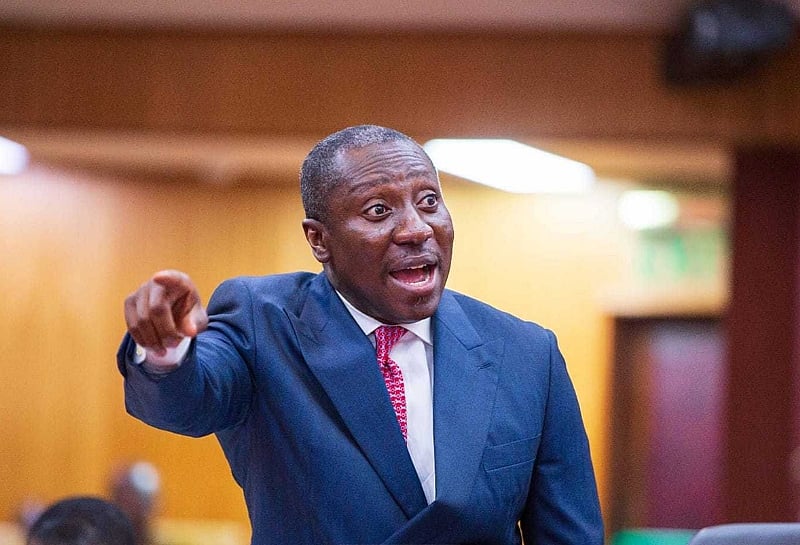Minority Leader Alexander Afenyo-Markin has initiated a formal challenge to a ruling made by the First Deputy Speaker of Parliament, a decision he contends undermines the fundamental principles of parliamentary democracy. The dispute centers on Private Members’ Motion No. 16, which sought parliamentary scrutiny of a controversial directive issued by the Chief of Staff. This directive mandated the mass revocation of public sector appointments, sparking concerns about potential abuse of executive power and the impact on affected individuals. The First Deputy Speaker dismissed the motion, citing the sub judice rule, arguing that the matter was already before the Supreme Court in the case of Henry Nana Boakye v. Attorney General. This dismissal, according to Afenyo-Markin, sets a dangerous precedent that could cripple Parliament’s oversight function and shield executive actions from scrutiny.
Afenyo-Markin’s petition argues that the First Deputy Speaker’s interpretation of the sub judice rule is flawed and overly broad. He contends that the mere existence of related litigation should not automatically preclude Parliament from exercising its constitutional mandate to scrutinize government actions. He warns that such an interpretation effectively subordinates Parliament’s authority to the judiciary, potentially allowing strategic litigation to silence legislative debate and impede accountability. The core of Afenyo-Markin’s argument rests on the principle of separation of powers, emphasizing that Parliament has a distinct and vital role to play in holding the executive branch accountable, a role that cannot be curtailed by ongoing court proceedings unless a specific court order restricts such parliamentary action.
The petition emphasizes the potential chilling effect this ruling could have on parliamentary inquiry. Afenyo-Markin suggests that, if left unchallenged, this precedent could embolden the executive branch to evade scrutiny by simply initiating legal proceedings related to any controversial action. This, he argues, would undermine the balance of power inherent in a democratic system and weaken the very fabric of legislative oversight. He underscores that Parliament’s role as the voice of the people cannot be silenced by procedural maneuvers that limit its ability to address matters of public importance. This, he asserts, is particularly crucial when executive actions impact the livelihoods and welfare of citizens, as in the case of the mass revocation of appointments.
To support his argument, Afenyo-Markin cites relevant legal precedent. He points to the Supreme Court’s 2025 ruling in Vincent Ekow Assafuah v. Attorney General, which affirmed that constitutional bodies, including Parliament, are entitled to carry out their functions unless explicitly restrained by a court order. He highlights the absence of such a restraining order in the present case, emphasizing that the First Deputy Speaker’s ruling effectively imposed a self-restraint on Parliament without any legal basis. This, he contends, is a dangerous overreach that could severely limit Parliament’s ability to fulfill its constitutional duties.
Furthermore, Afenyo-Markin invokes a 2012 precedent set by then-Speaker Joyce Bamford-Addo, who allowed parliamentary debate on matters of public interest even while related cases were pending before the courts. This precedent, he argues, demonstrates a clear understanding of Parliament’s role as a forum for national discourse and its ability to address issues of public concern irrespective of parallel judicial proceedings. By contrast, the First Deputy Speaker’s ruling, according to Afenyo-Markin, represents a departure from this established principle and sets a dangerous precedent that could significantly weaken Parliament’s oversight capacity.
Afenyo-Markin’s petition concludes with a call for immediate action by the Speaker of Parliament, urging him to invoke Standing Order 127 to revisit and overturn the March 5 ruling. He stresses the urgency of this matter, arguing that failing to rectify the error would establish a harmful precedent that would undermine Parliament’s ability to hold the executive accountable. He underscores that robust legislative oversight is not merely a procedural matter but a fundamental requirement of a healthy democracy, essential for protecting the rights and interests of the citizens. The Speaker’s decision on this petition, therefore, holds significant implications for the future of parliamentary democracy in Ghana.


